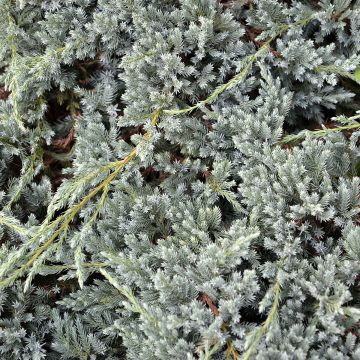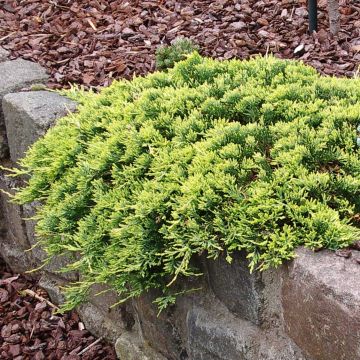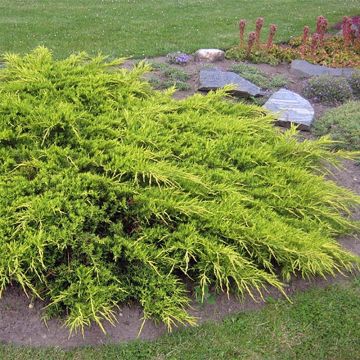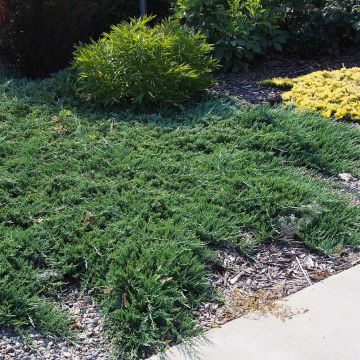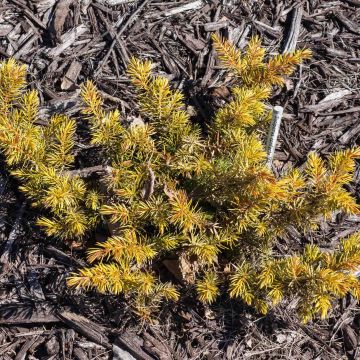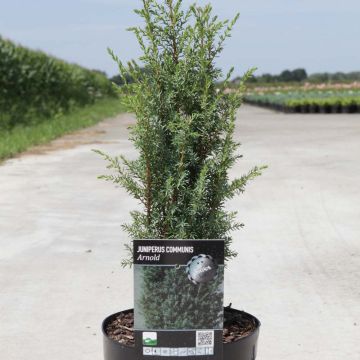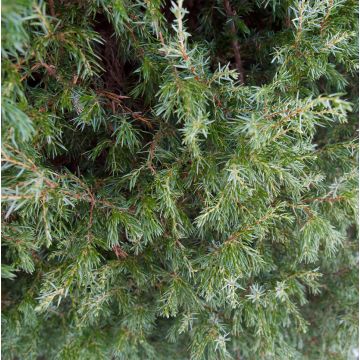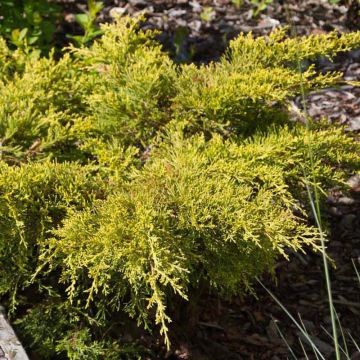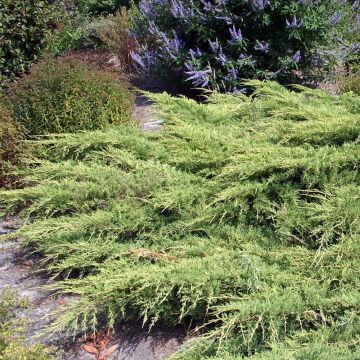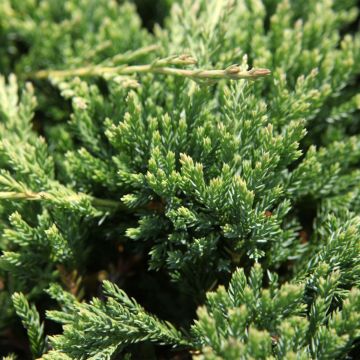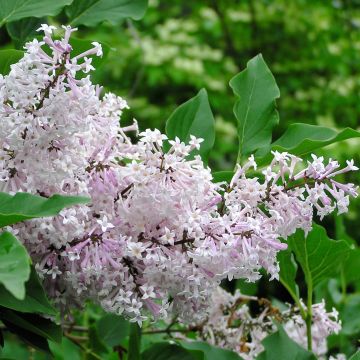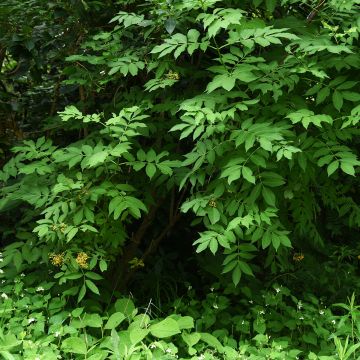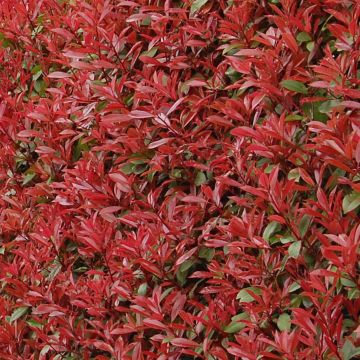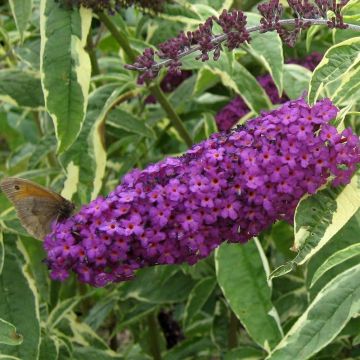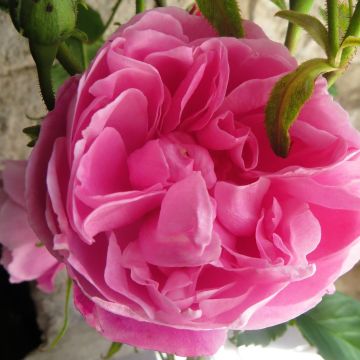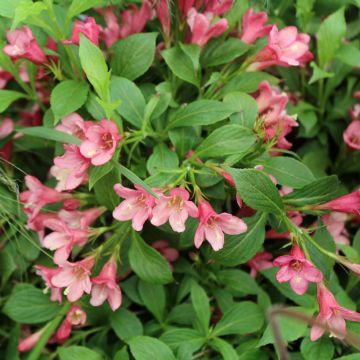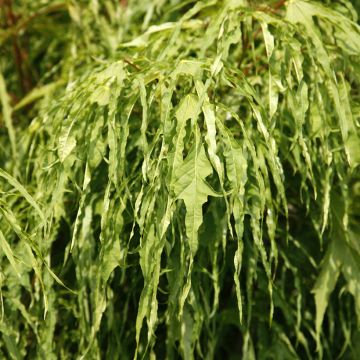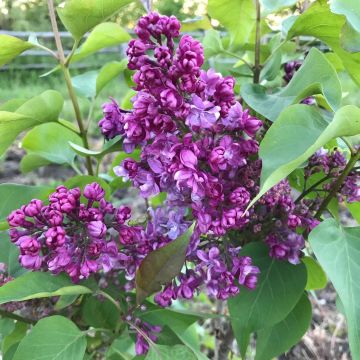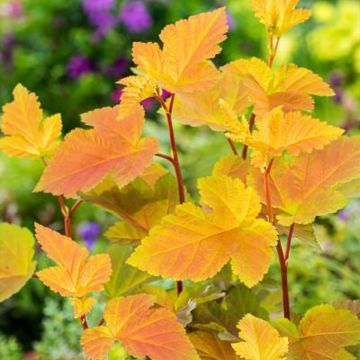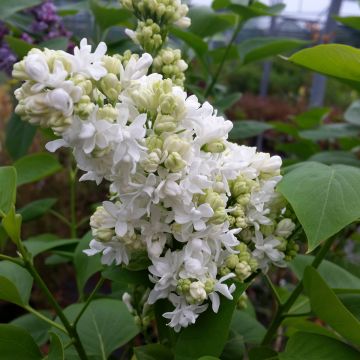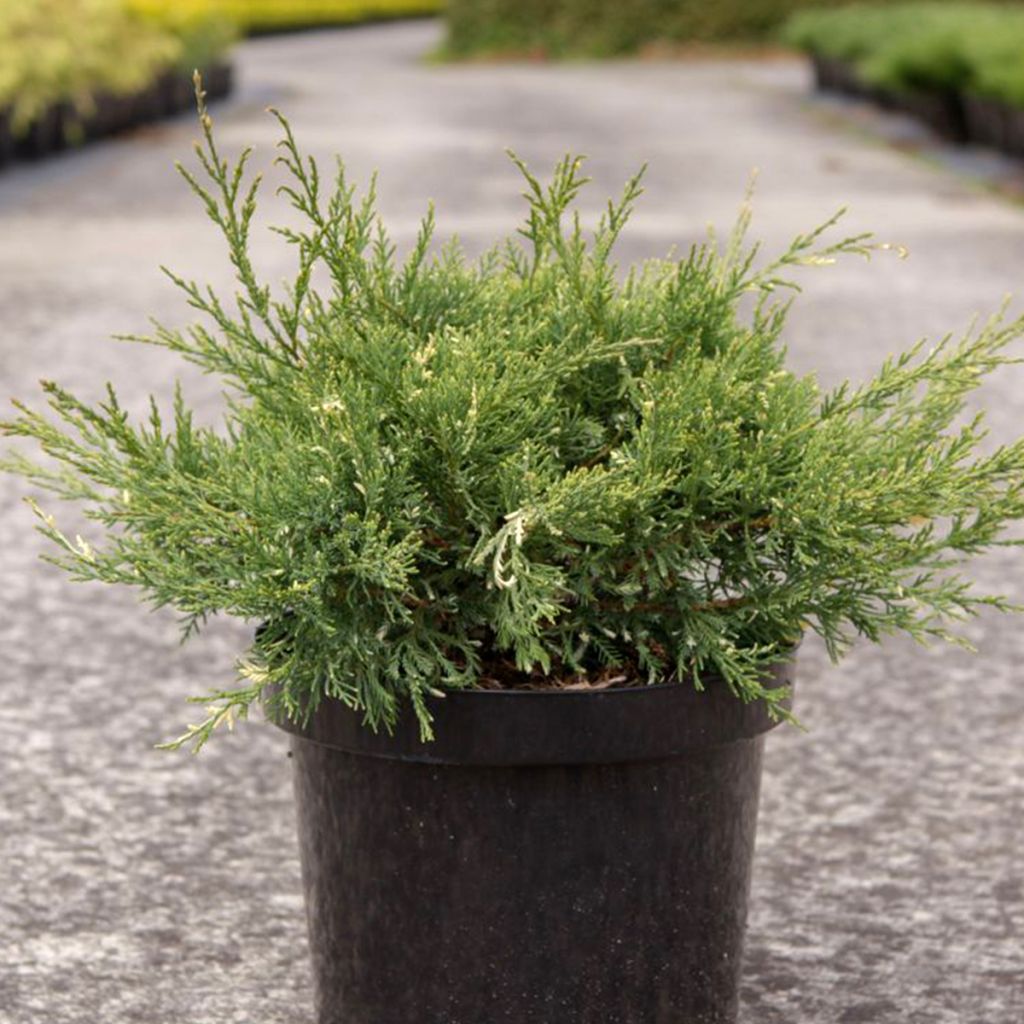

Juniperus pfitzeriana White Splash
Juniperus pfitzeriana White Splash
Juniperus pfitzeriana White Splash
Pfitzer Juniper, Chinese juniper
This item cannot be shipped to the selected country
Delivery charge from €5.90
Delivery to Corse prohibited
More information
Schedule delivery date,
and select date in basket
This plant carries a 24 months recovery warranty
More information
We guarantee the quality of our plants for a full growing cycle, and will replace at our expense any plant that fails to recover under normal climatic and planting conditions.
From €5.90 for pickup delivery and €6.90 for home delivery
Express home delivery from €8.90.
Delivery to Corse prohibited: UE law prohibits the import of this plant from mainland France to Corse as part of the fight against Xylella fastidiosa. Please accept our sincere apologies.
More information
Does this plant fit my garden?
Set up your Plantfit profile →
Description
Juniperus pfitzeriana ‘White Splash’ is a very hardy hybrid juniper, forming a medium-sized bush with a spreading habit. It is adorned with fine, evergreen, non-prickly foliage of a glaucous green colour, with some white shoots in certain areas. It grows in full sun to partial shade, in ordinary, well-drained soil, even poor, occasionally dry and chalky, and is not afraid of cold temperatures down to -20 °C, or even lower. A rare variety for gardeners looking for originality!
Juniperus pfitzeriana, or Pfitzer juniper, is an old hybrid variety that was very popular in the early 20th century. It owes its name to Wilhelm Spitzer, head of cultivation at the Späth nursery in Germany, where this cultivar originated in the 1890s. It is believed to be a cross between J. chinensis, the Chinese juniper, and J. sabina, a montane species found in Europe, North Africa, and Asia. It is a very hardy and ornamental conifer, belonging, like its parents, to the Cupressaceae family, which includes many ornamental genera (Cupressus, Thuja, Libocedrus...).
The ‘White Splash’ cultivar is characterized by its glaucous green foliage, slightly bluish, which is punctuated by white shoots in certain areas, although this distinctiveness remains quite discreet. It is not a variegation, as can be found in other species. It forms a spreading bush of about 1m (3ft 4in) in height and 1.80m (5ft 11in) in width. Its fine and flexible branches are covered with tightly packed, non-prickly leaves. This juniper is robust and can withstand difficult conditions if planted in well-drained soil, as it only fears excessive water. Hardy to at least -20 °C, it tolerates drought quite well, requiring only occasional watering during prolonged dry periods. Junipers have a shallow root system, which makes them vulnerable to strong winds and difficult to combine with perennials.
The ‘White Splash’ Pfitzer juniper is a hardy conifer that will interest curious gardeners looking for diversification. It is therefore best planted as a standalone specimen rather than in groups, but it will also fit well in a border alongside other undemanding plants. Physocarpus 'Dart's Gold', with its yellow-green foliage, will create a beautiful contrast, as will the numerous varieties of Cotinus (smoke bushes) in golden or purple hues. A beautiful fastigiate yew (Taxus baccata 'Fastigiata Robusta') with its dark green persistent foliage will accompany our juniper in a contemporary garden, where their graphic appearance will be well highlighted.
Report an error about the product description
Juniperus pfitzeriana White Splash in pictures
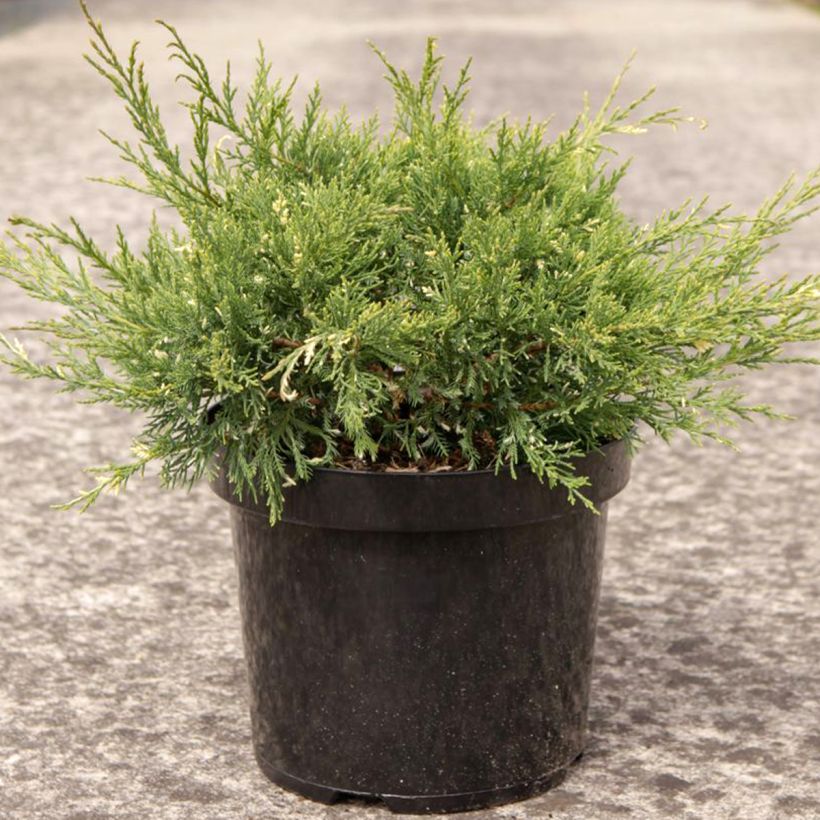

Plant habit
Foliage
Safety measures
Botanical data
Juniperus
pfitzeriana
White Splash
Cupressaceae
Pfitzer Juniper, Chinese juniper
Cultivar or hybrid
atteinterespiratoire
Cette plante peut entraîner des symptômes allergiques.
Evitez de la planter si vous ou vos proches souffrez de rhinite saisonnière ("rhume des foins").
Davantage d'informations sur https://plantes-risque.info
Other Juniperus - Juniper
Planting and care
Juniperus pfitzeriana 'White Splash' should be planted from September to November and from February to April in well-drained, light, even calcareous and poor soil. It is not bothered by rocky or sandy soil that is occasionally dry. Choose a very sunny location preferably, or possibly partially shaded in a very bright climate, and sheltered from prevailing winds.
Soak the root ball in a bucket for fifteen minutes to thoroughly saturate it before planting. Dig a hole 50cm (19.7in) in all directions and add organic amendment to the planting hole by mixing it with the soil at the bottom of the pit. Water regularly for the first two years to facilitate root growth, afterwards this conifer can withstand drought well. Apply a special conifer fertilizer every year in April and cultivate the soil in summer.
This very hardy conifer particularly dislikes heavy, waterlogged soils in winter. Pruning is not obligatory, but this conifer can be pruned to maintain a beautiful habit or to give it a specific shape. Old wood, devoid of needles, rarely regrows. Prune from June to September with a well-sharpened secateur for clean cuts.
Planting period
Intended location
Care
This item has not been reviewed yet - be the first to leave a review about it.
Foolproof Shrubs
Haven't found what you were looking for?
Hardiness is the lowest winter temperature a plant can endure without suffering serious damage or even dying. However, hardiness is affected by location (a sheltered area, such as a patio), protection (winter cover) and soil type (hardiness is improved by well-drained soil).

Photo Sharing Terms & Conditions
In order to encourage gardeners to interact and share their experiences, Promesse de fleurs offers various media enabling content to be uploaded onto its Site - in particular via the ‘Photo sharing’ module.
The User agrees to refrain from:
- Posting any content that is illegal, prejudicial, insulting, racist, inciteful to hatred, revisionist, contrary to public decency, that infringes on privacy or on the privacy rights of third parties, in particular the publicity rights of persons and goods, intellectual property rights, or the right to privacy.
- Submitting content on behalf of a third party;
- Impersonate the identity of a third party and/or publish any personal information about a third party;
In general, the User undertakes to refrain from any unethical behaviour.
All Content (in particular text, comments, files, images, photos, videos, creative works, etc.), which may be subject to property or intellectual property rights, image or other private rights, shall remain the property of the User, subject to the limited rights granted by the terms of the licence granted by Promesse de fleurs as stated below. Users are at liberty to publish or not to publish such Content on the Site, notably via the ‘Photo Sharing’ facility, and accept that this Content shall be made public and freely accessible, notably on the Internet.
Users further acknowledge, undertake to have ,and guarantee that they hold all necessary rights and permissions to publish such material on the Site, in particular with regard to the legislation in force pertaining to any privacy, property, intellectual property, image, or contractual rights, or rights of any other nature. By publishing such Content on the Site, Users acknowledge accepting full liability as publishers of the Content within the meaning of the law, and grant Promesse de fleurs, free of charge, an inclusive, worldwide licence for the said Content for the entire duration of its publication, including all reproduction, representation, up/downloading, displaying, performing, transmission, and storage rights.
Users also grant permission for their name to be linked to the Content and accept that this link may not always be made available.
By engaging in posting material, Users consent to their Content becoming automatically accessible on the Internet, in particular on other sites and/or blogs and/or web pages of the Promesse de fleurs site, including in particular social pages and the Promesse de fleurs catalogue.
Users may secure the removal of entrusted content free of charge by issuing a simple request via our contact form.
The flowering period indicated on our website applies to countries and regions located in USDA zone 8 (France, the United Kingdom, Ireland, the Netherlands, etc.)
It will vary according to where you live:
- In zones 9 to 10 (Italy, Spain, Greece, etc.), flowering will occur about 2 to 4 weeks earlier.
- In zones 6 to 7 (Germany, Poland, Slovenia, and lower mountainous regions), flowering will be delayed by 2 to 3 weeks.
- In zone 5 (Central Europe, Scandinavia), blooming will be delayed by 3 to 5 weeks.
In temperate climates, pruning of spring-flowering shrubs (forsythia, spireas, etc.) should be done just after flowering.
Pruning of summer-flowering shrubs (Indian Lilac, Perovskia, etc.) can be done in winter or spring.
In cold regions as well as with frost-sensitive plants, avoid pruning too early when severe frosts may still occur.
The planting period indicated on our website applies to countries and regions located in USDA zone 8 (France, United Kingdom, Ireland, Netherlands).
It will vary according to where you live:
- In Mediterranean zones (Marseille, Madrid, Milan, etc.), autumn and winter are the best planting periods.
- In continental zones (Strasbourg, Munich, Vienna, etc.), delay planting by 2 to 3 weeks in spring and bring it forward by 2 to 4 weeks in autumn.
- In mountainous regions (the Alps, Pyrenees, Carpathians, etc.), it is best to plant in late spring (May-June) or late summer (August-September).
The harvesting period indicated on our website applies to countries and regions in USDA zone 8 (France, England, Ireland, the Netherlands).
In colder areas (Scandinavia, Poland, Austria...) fruit and vegetable harvests are likely to be delayed by 3-4 weeks.
In warmer areas (Italy, Spain, Greece, etc.), harvesting will probably take place earlier, depending on weather conditions.
The sowing periods indicated on our website apply to countries and regions within USDA Zone 8 (France, UK, Ireland, Netherlands).
In colder areas (Scandinavia, Poland, Austria...), delay any outdoor sowing by 3-4 weeks, or sow under glass.
In warmer climes (Italy, Spain, Greece, etc.), bring outdoor sowing forward by a few weeks.

































